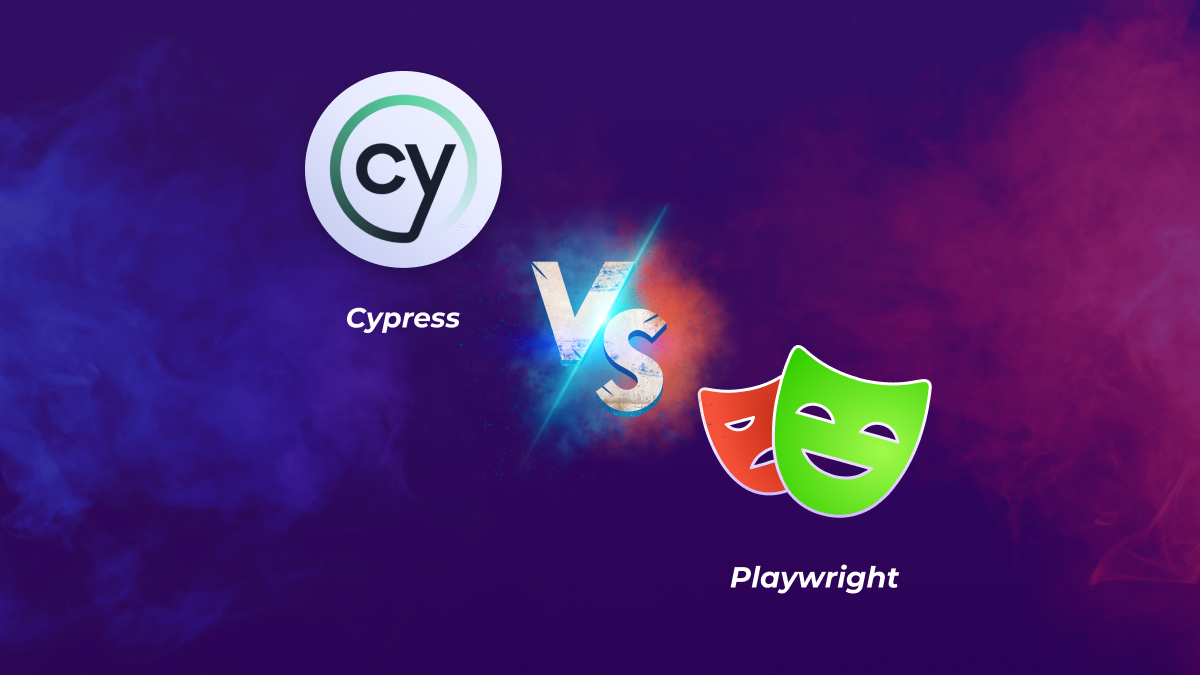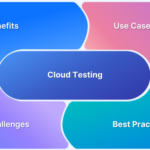In the growing era of web development, choosing the appropriate automated test framework can break or make your test strategy. Two of the main preferred tools in the new-edge Quality Assurance (QA) landscape are Playwright & Cypress. The debate of Cypress vs Playwright continues to heat up as experts seek the accurate balance of speed, consistency, & ease of use.
Just like selecting the correct tool to decode a Morse code translator, choosing between Playwright and Cypress depends deeply on your particular team’s knowledge, browser support requirements, project needs, and scalability objectives. In this article, we will break down the core strengths, distinctions, and best use cases for every single framework, so you can make a well-informed decision & optimize your frontend tests procedure.
What Is Cypress?
It is a well-known JavaScript-based E2E testing framework for web apps, perfectly designed to streamline and enhance the test procedure. It’s known for its accuracy, speed, and easy-to-use functionalities that make it a preferred choice among front-end software developers. It enables software developers to create, run, & debug tests directly within the web browser, making it quicker & more intuitive than old testing tools.
Let us take a comprehensive look at what Cypress provides:
Key Features
- E2E Tests
It is perfectly designed to test the complete app, from the UI (user interface) to the backend, in a web browser.
- JavaScript-centric
Tests are written in JS (JavaScript), making it simple for front-end software developers to study & use.
- Built-in Commands
It gives a rich set of built-in commands that streamline common testing deed like interacting with User Interface (UI) components and making assertions.
- Visual Tests
It enables visual scrutiny of the app during testing, assisting in detecting visual regressions or other problems.
- Time Travel Debugging
It takes snapshots of the app as it runs, enabling software developers to go back in time & debug problems more efficiently.
- Flake-resistant
It is perfectly designed to be less prone to flaky testing, meaning tests are more consistent & accurate.
- Accessibility Tests
It can be utilized for testing the accessibility of web apps.
- Component Tests
It supports component testing, enabling software developers to test separate elements in isolation.
- User Interface (UI) Coverage
It can detect testing gaps and give a visual overview of test coverage.
- Accessibility Checks
It enables you to add 1000s of accessibility checks to your current tests.
Advantages of using Cypress
- Rapid Tests
It runs tests straight in the browser, making them considerably quicker than tests that use an individual browser driver.
- More Reliable Tests
It is perfectly designed to be less flaky & accurate, resulting in lesser false positives.
- Easier Debugging
Its integrated debugging tools make it easier to identify and resolve issues.
- Better UX (User Experience)
It’s intuitive interface & traits make it simpler for software developers to learn & use.
- Open-source & Freemium
It is an open-source and free framework, and it also provides a freemium model.
What Is Playwright?
This open-source automated test framework and library is mostly used for E2E testing of online apps. Playwright allows software developers to automate browser interactions across distinct platforms and web browsers, and supports various programming languages. It gives a method to replicate user actions within a web browser, enabling dynamic tests & automation of web apps.
Here’s a more detailed breakdown:
- Purpose
It is perfectly designed for automating browser deeds, ranging from easy page navigation & content scraping to intricate actions such as user interactions & form submissions.
- Cross-Browser Support
It supports Mozilla Firefox, Chromium (MS Edge, Chrome), and WebKit (Safari), guaranteeing consistent tests across well-known browsers.
- Cross-Platform
It runs on macOS, Linux, and Windows, making it appropriate for several software development environments.
- E2E (End-to-End) Tests
It is well-suited for E2E testing, where the complete app system is tested to confirm proper functionality.
- Cross-Language
It supports scripting in Python, TypeScript, C#, JavaScript, and Java, enabling software developers to pick their preferred language.
- Modern Web Apps
It’s chiefly well-suited for testing SPAs (single-page apps) & PWAs (progressive web apps).
- Community Driven & Open-Source
The free/open-source project was developed by Microsoft and benefits from a vibrant community.
- Rapid & Reliable
It is ideal for having a test framework that is quick, precise, and reliable.
- Tooling Support
It provides a set of tools, counting a test generator, VS Code extension, trace viewer, and User Interface (UI) mode, to improve the developer experience.
- Browser Context
It generates a browser context for every single test, giving full isolation and enabling simple login & state preservation across tests.
- Trace Viewer
Trace Viewer gives comprehensive data about test implementations, including action explorer, DOM snapshots, and screencasts, which helps in understanding test failures & debugging.
- Parallel Test Implementation
It also supports parallel test implementation, enabling rapid tests & better test coverage.
Feature Comparison: Cypress vs Playwright
Playwright and Cypress are well-known testing frameworks for E2E (end-to-end) tests, each with different strengths. Playwright excels in complete browser support, various languages, and modern traits such as mobile emulation and network interception, making it perfect for cross-browser testing and complicated apps. Cypress, on the other hand, is well-known for its real-time reloading, developer-friendly interface, & simple debugging approach, making it a great fit for projects intensive on JavaScript and Chromium-centric web browsers.
Cypress:
- Strengths:
- Developer-friendly interface with easy debugging & real-time reloading.
- Focus on Chromium-based browsers and JavaScript.
- Offers built-in traits such as command retry & automatic waiting.
- Rich tests knowledge with time travel visualization.
- Drawbacks:
- Less inclusive browser support in contrast to Playwright.
- Lacks some modern features such as mobile simulation & network interception natively.
Playwright:
- Strengths:
- Supports several languages and web browsers, making it suitable for cross-browser tests.
- Offers sophisticated features such as mobile emulation, network interception, and window/ multiple tab tests.
- Rapid implementation speed and dynamic bug management.
- Built-in tools for creating tests (Playwright Codegen).
- Drawbacks:
- Compared to Cypress, it could be more difficult to set up and understand.
- Needs more external tools & libraries for specific features.
Feature Comparison: Cypress vs Playwright
| Feature | Cypress | Playwright |
| Browser Support | Chiefly Chromium-based. | Various languages and browsers. |
| Language | Supports TypeScript, JavaScript. | Supports myraid languages, including Java, Python, C#,. NET, etc. |
| Setup Complexity | Simple Setup. | Simple Setup. |
| Developer Experience | Simple to learn & use, real-time reload. | Can be intricate to set up, particularly with TypeScript. |
| Test Runner Frameworks Supported | Mocha. | Jest, Mocha, Jasmine. |
| Advanced Features | Restricted. | Extensive (for instance, mobile emulation, network interception, etc.). |
| Focus | JavaScript, Front-end tests. | Cross-browser tests, several languages. |
| Multi-tab Testing | Not supported. | Supported. |
Mobile Simulation | Basic. | Advanced. |
| Debugging | Strong UI-based debugging. | Excellent console-based debugging. |
| Operating Systems (OS) Supported | macOS 10.9 and higher, Windows, and Linux. | MacOS, Linux, and Windows. |
CI/CD Integration | Strong. | Strong. |
Community & Docs | Mature, huge community. | Fast growing, strong documents. |
Use Cases: When to Pick Cypress vs Playwright
The complexity of the project, your team organization, and your testing requirements will all play a role in your decision between Playwright and Cypress. Let us check out the definitive use cases to guide your decision:
When to Choose Cypress
- Rapid Feedback for Frontend Teams
Perfect for teams working with frameworks like Angular, React, or Vue to create single-page apps (SPAs). Cypress gives immediate reloads & time-travel debugging, which expedites the software development cycle.
- JavaScript-based Teams
If your QA engineers and software developers are working completely in TypeScript or JavaScript, Cypress’s syntax and configuration feel frictionless & native.
- Easy Browser Support Needs
For experts who need to test on Chromium-centric browsers or Firefox, Cypress eases the configuration without sacrificing performance.
- Test Implementation & Debugging Inside the Browser
It runs in the same browser context as your application, enabling deep visibility & simpler debugging.
- Rapid Start & Low Learning Curve
Projects, startups, and small teams with restricted resources benefit from Cypress’s simple onboarding & slight configuration.
When to Choose a Playwright
- Complete Cross-Browser Coverage (Counting Safari)
It supports Firefox, WebKit, and Chromium, making it the superior selection for apps requiring comprehensive browser validation.
- Complicated User Journeys
Need to test multi-tab systems, several domains, verification flows, or file downloads? It manages them flawlessly, areas where Cypress has known restrictions.
- Enterprise-Scale Tests
For big-scale test suites & CI/CD pipelines, its headless mode, parallel implementation, and language flexibility (C#, JavaScript, Java, Python) make it extremely scalable.
- Modern DevOps Incorporation
It functions well with modern DevOps settings & proffers extensive control over API mocking, test situations, & network conditions.
- Non-JS (JavaScript) Teams
If your automated test team comprises engineers proficient in .NET, Java, Python, or, Playwright’s multi-language back-up is a clear benefit.
Consider LambdaTest for Scalable, Unified Automation
Whether you select Cypress for its ease or Playwright for its power, handling cross-browser tests at scale can still be a challenge, particularly across distinct gadgets & environs. This is where LambdaTest comes in. It is an AI-native cloud-centric testing platform that allows you to run Playwright, Cypress, & other test frameworks—including projects like a Morse code translator app across 3,000+ actual devices and browsers, without the need to manage local infrastructure.
Crucial Benefits
- Run Playwright & Cypress tests in the cloud.
- Parallel implementation to expedite test cycles.
- Cross-device and cross-browser coverage at scale.
- CI/CD Incorporation with tools such as GitLab, GitHub, and Jenkins.
- Automated and Live tests in a combined dashboard.
LambdaTest supports software developers and QA teams in expediting test implementation, expanding coverage, and enhancing productivity, making it a strong companion to both Playwright & Cypress.
Can non-developers use Playwright or Cypress effortlessly?
While Playwright & Cypress are outstanding tools for frontend automation, they are chiefly designed for QA engineers or Software developers with programming knowledge, particularly in TypeScript, JavaScript, or other supported languages (such as Java or Python in Playwright’s case).
Non-developers might find it challenging to create & maintain test scripts, handle test environments, or debug automation failures using these test frameworks alone.
Utilize LambdaTest to Bridge the Gap
For teams that comprise manual QA testers and non-developers, LambdaTest gives a much more approachable solution:
- Run Playwright & Cypress tests without local configuration.
- Use a cloud-centric & intuitive dashboard for test implementation & reporting.
- Incorporate tests with CI/CD pipelines effortlessly.
- Leverage live testing features for exploratory testing—no coding required.
LambdaTest allows non-developers to participate in QA by simplifying the test implementation procedure and providing a user-friendly interface for cross-browser tests at scale.
So, while creating scripts in Playwright or Cypress might still require technical expertise, LambdaTest allows broader team teamwork, bringing QA engineers, software developers, & manual QA testers onto a united platform.
Final Verdicts
The Cypress vs Playwright debate eventually boils down to your project’s precise needs. If you are seeking rapid configuration, tight developer incorporation, and a higher debugging experience for JavaScript-centric applications, Cypress is a fantastic selection. On the flip side, if you need robust cross-browser support (counting Safari), more flexibility, and the capacity to test intricate user flows, Playwright provides superior capabilities.
Picking the correct automated testing framework is a bit like using a Morse code translator, you need the correct tool to decode the accurate message. And in recent Quality Assurance (QA), the correct toolchain can break or make your release cycles. But what if you want the best of both worlds, scalability, actual web browser coverage, & smooth test implementation without infrastructure headaches?
This is where LambdaTest comes in. With LambdaTest, you can conduct your Playwright and Cypress tests in the cloud across 3000s of actual browser & Operating System (OS) combinations. It incorporates smoothly with CI/CD pipelines, allows parallel implementation for rapid feedback, and even supports visual & manual tests, all on a unified, solo platform.
Are you ready to Scale Your Frontend Tests? Start your free LambdaTest trial now & supercharge your Cypress vs Playwright automation!



